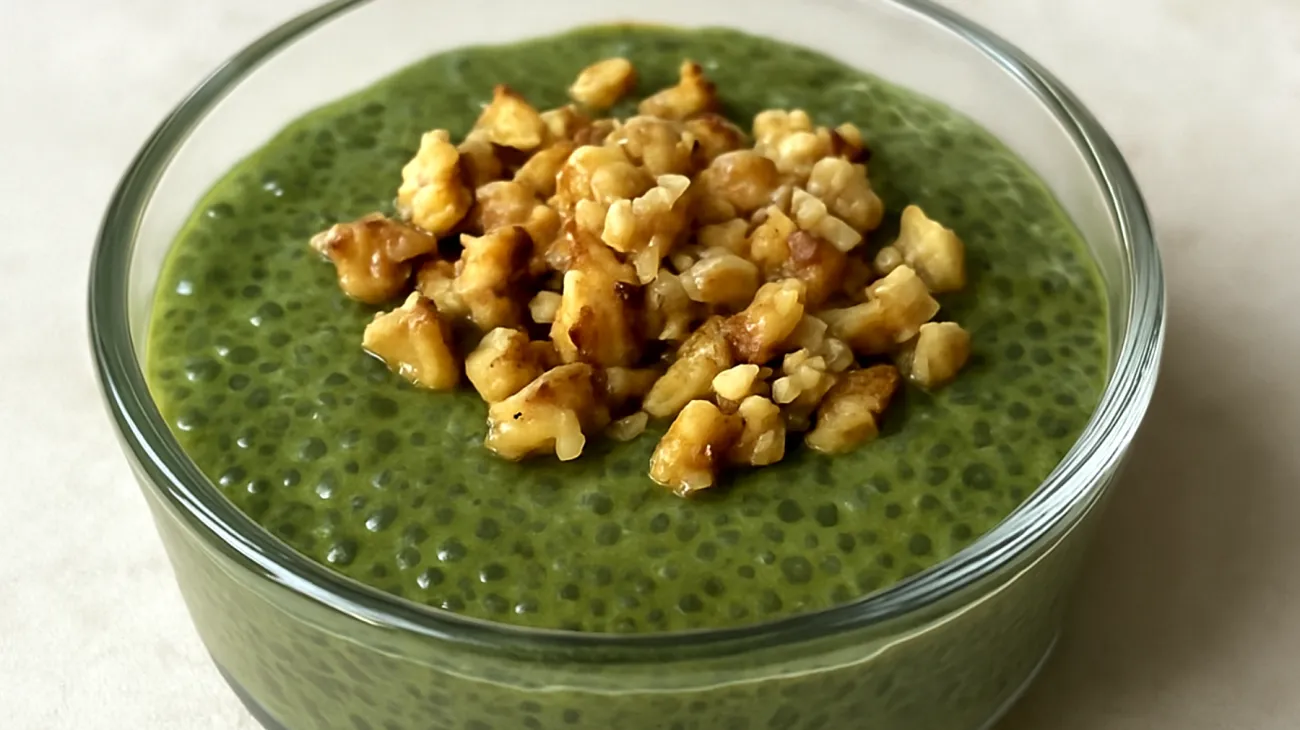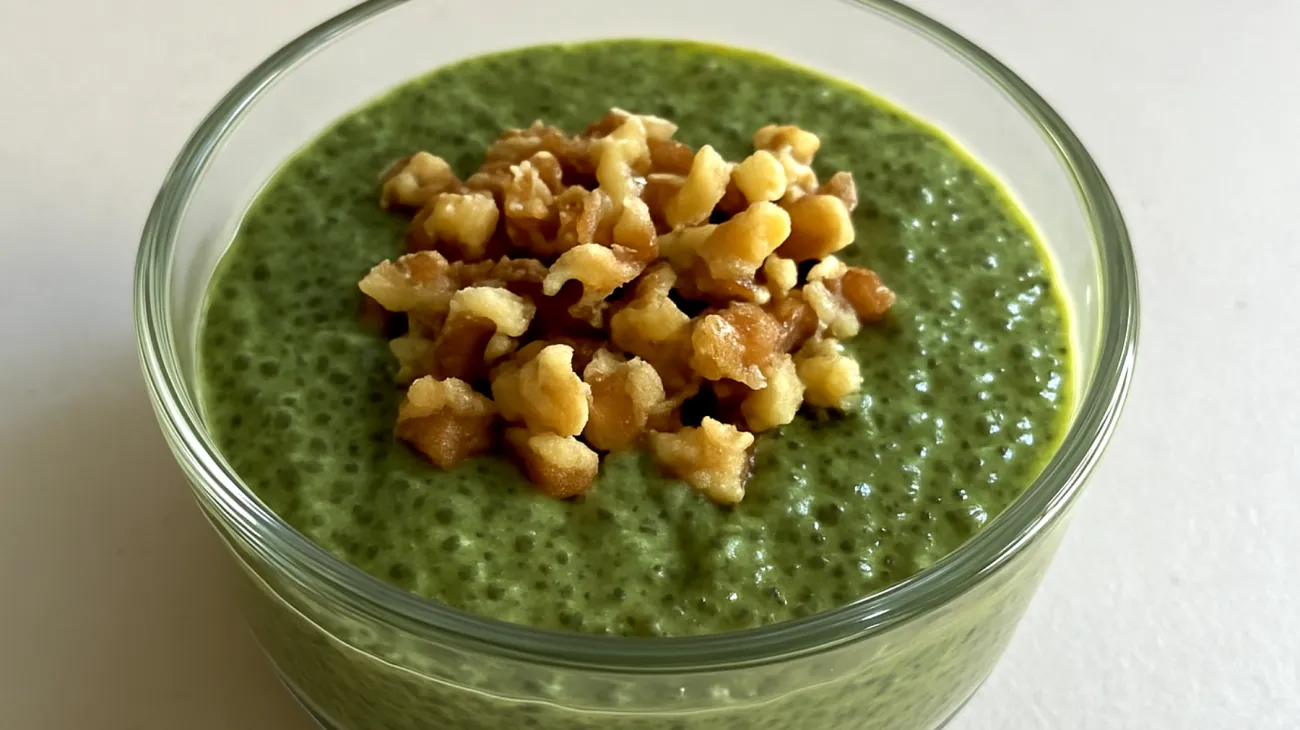The relentless ticking of the clock becomes your enemy when you’re battling fatigue at 3 AM, staring at computer screens or navigating complex tasks while your circadian rhythm begs for sleep. For shift workers juggling irregular schedules, impaired sleep routinely leads to deficits in attention, working memory, and reaction times, making the search for sustained mental clarity without the inevitable energy crash a critical health and performance issue.
The Science Behind Matcha Chia Pudding’s Cognitive Power
This emerald-hued powerhouse combines ancient Japanese wisdom with modern superfood science. Matcha delivers a caffeine source combined with L-theanine, an amino acid that promotes calm alertness and modulates the stimulating effects of caffeine. Controlled studies have shown that the combination of caffeine and L-theanine improves attention, memory, and task performance compared to caffeine alone in healthy adults.
L-theanine can smooth caffeine’s absorption, resulting in fewer jitters and longer-lasting focus — effects particularly valuable for shift workers needing sustained attention without subsequent energy crashes. This makes it an ideal alternative to conventional energy sources that often leave workers dealing with aggressive caffeine spikes.
Chia Seeds: The Unsung Heroes of Cognitive Endurance
Chia seeds provide nutrients that support overall health and brain function. Each tablespoon offers about 1.7–2.5 grams of omega-3 fatty acids (mostly ALA), which are required for maintaining neuronal membrane integrity and cognitive function during irregular sleep patterns that typically disrupt brain maintenance processes.
When soaked overnight, chia seeds develop their characteristic gel-like texture that slows digestion and releases slow-digesting carbohydrates, gradually supplying glucose to the brain and helping prevent blood sugar fluctuations that could harm concentration during critical work hours.
Walnuts: Nature’s Brain-Shaped Superfood
The visual resemblance between walnuts and brain tissue reflects their nutritional value for cerebral health. Walnuts contain the highest concentration of alpha-linolenic acid (ALA) among all nuts, a plant-derived omega-3 fatty acid linked to neuroplasticity and cognitive resilience.
Recent research from UCLA found that walnut intake was associated with better cognitive function, particularly in attention and working memory — areas crucial for shift workers maintaining peak performance during demanding schedules.
The Magnesium Connection
Both chia seeds and walnuts are good sources of magnesium, a mineral necessary for hundreds of biological processes, including stress regulation and neurotransmitter synthesis. Magnesium has been shown to support the conversion of tryptophan to serotonin, which is important for stress management in individuals with irregular sleep rhythms.

For shift workers dealing with elevated stress hormones from disrupted sleep cycles, this mineral helps regulate the nervous system while supporting better stress management during demanding work periods.
Timing Your Cognitive Fuel Strategy
Strategic consumption timing transforms this pudding from a simple snack into a precision tool for peak performance. Consuming this blend 2–3 hours before a demanding work period allows L-theanine and caffeine to reach peak blood levels, while chia’s carbohydrates provide steady energy delivery.
For night shift workers starting at 11 PM, an 8 AM pudding provides the perfect midday fuel without interfering with afternoon sleep preparation. To minimize sleep disruption, night shift workers should avoid caffeine-rich foods in the latter part of their shift, while day shift workers should avoid them after 6 PM, since even moderate caffeine intake can disrupt sleep quality and worsen cognitive decline over time.
Preparation Mastery for Maximum Benefits
The overnight soaking process goes beyond texture — it’s about nutrient optimization. Overnight soaking of chia seeds improves their digestibility and bioavailability of minerals, including calcium and magnesium, due to degradation of phytic acid. This preparation method also yields the signature creamy consistency that makes it satisfying enough to prevent mindless snacking later.
- Combine 3 tablespoons chia seeds with 1 cup plant milk
- Add 1 teaspoon high-grade ceremonial matcha powder
- Sweeten minimally with maple syrup or dates
- Top with 6–8 walnut halves before serving
- Refrigerate overnight for optimal gel formation
Managing Caffeine Sensitivity for Optimal Results
While matcha delivers caffeine more gently than coffee, individual sensitivity to stimulants varies significantly among shift workers. Those sensitive to caffeine should start with smaller portions and monitor their response, especially regarding sleep quality, since excessive caffeine can impair recovery and lead to tolerance.
Health experts recommend limiting caffeine intake to less than 400 mg daily for healthy adults, with lower thresholds for those sensitive or working shifts. This daily limitation helps prevent caffeine tolerance, which would diminish cognitive benefits while potentially disrupting the delicate balance shift workers need between alertness and recovery.
This evidence-based approach recognizes that shift work demands more than willpower — it requires nutritional strategies that support cognitive function and sustained energy, with careful attention to timing, preparation, and individual sensitivity. The combination of sustained energy release, cognitive support, and practical preparation makes this pudding an invaluable tool for maintaining peak performance during society’s most demanding work schedules.
Table of Contents

